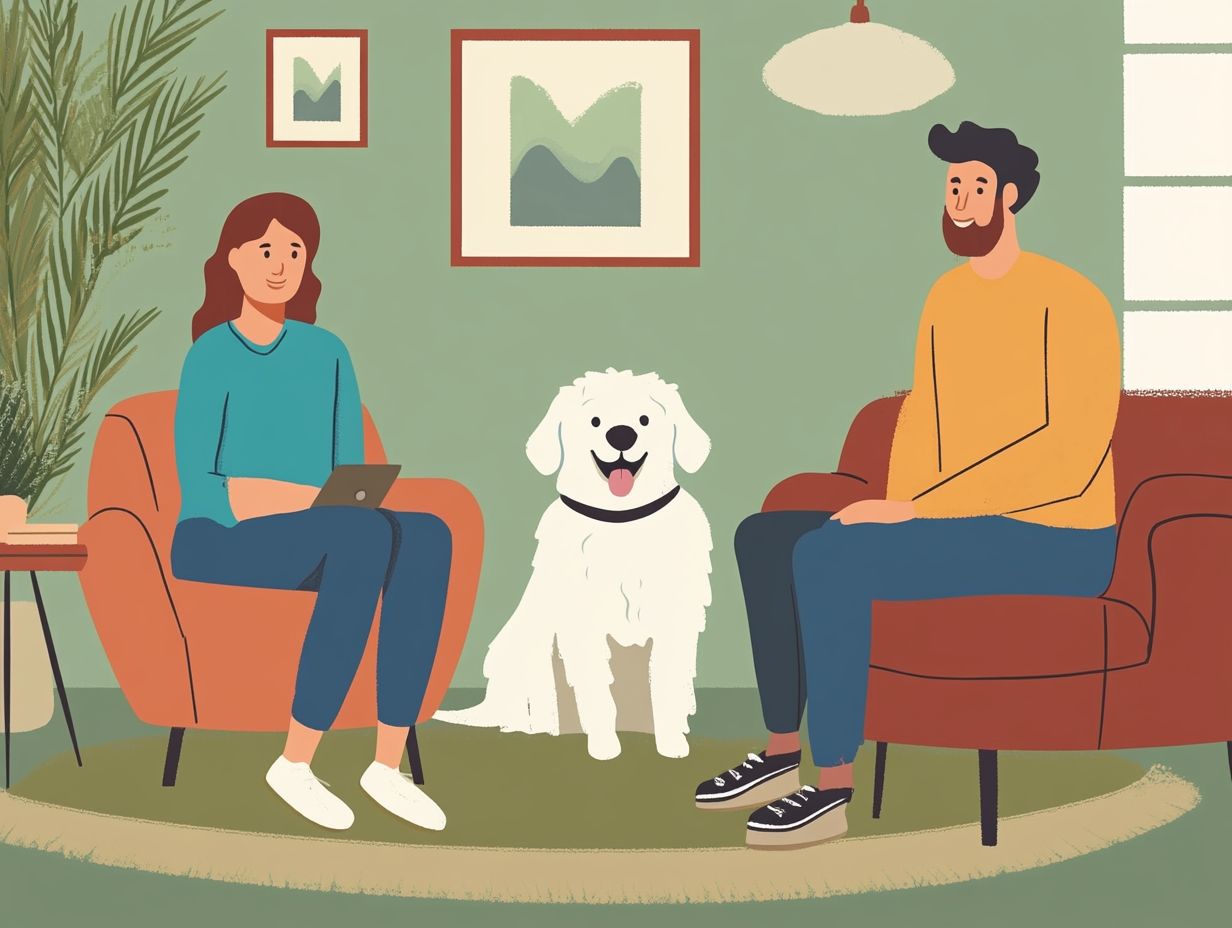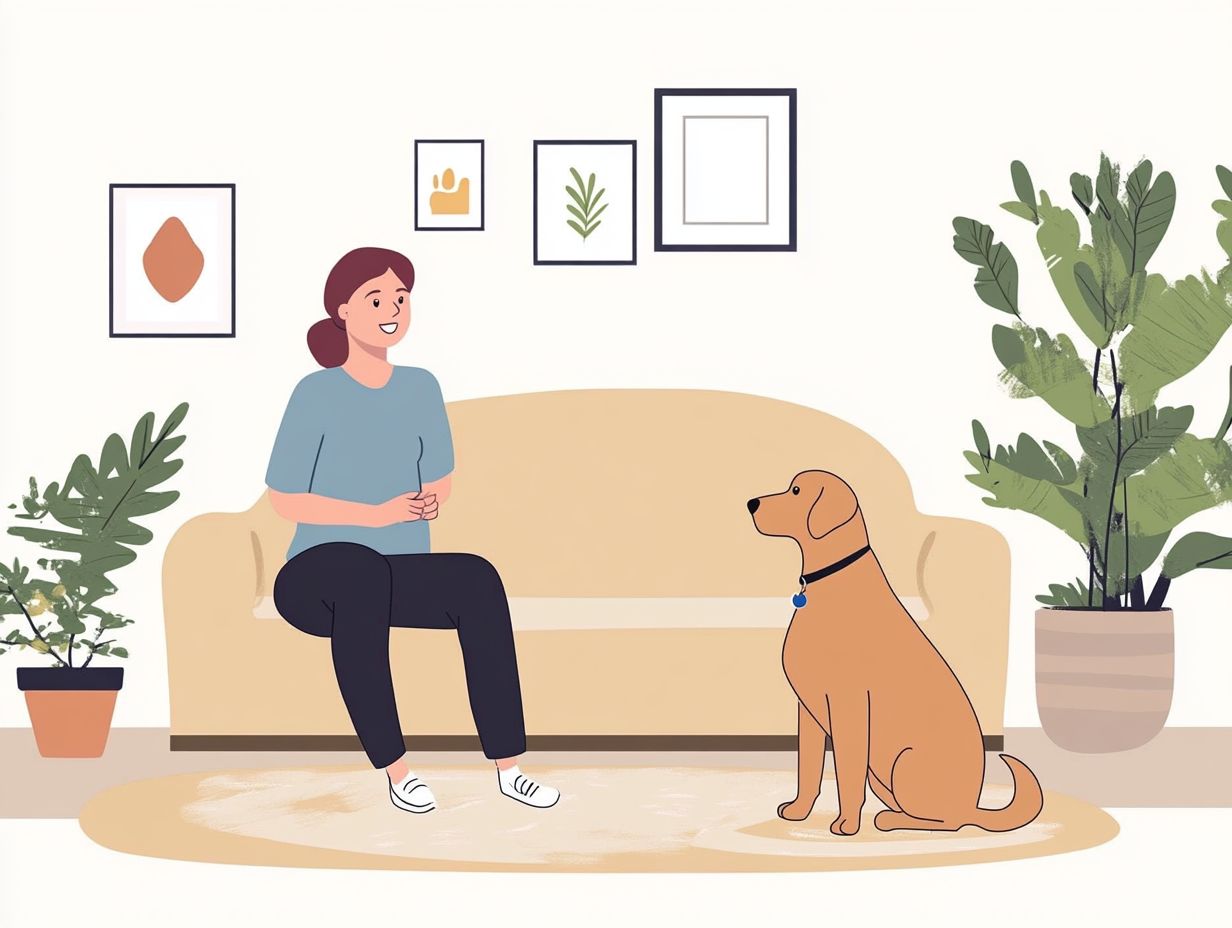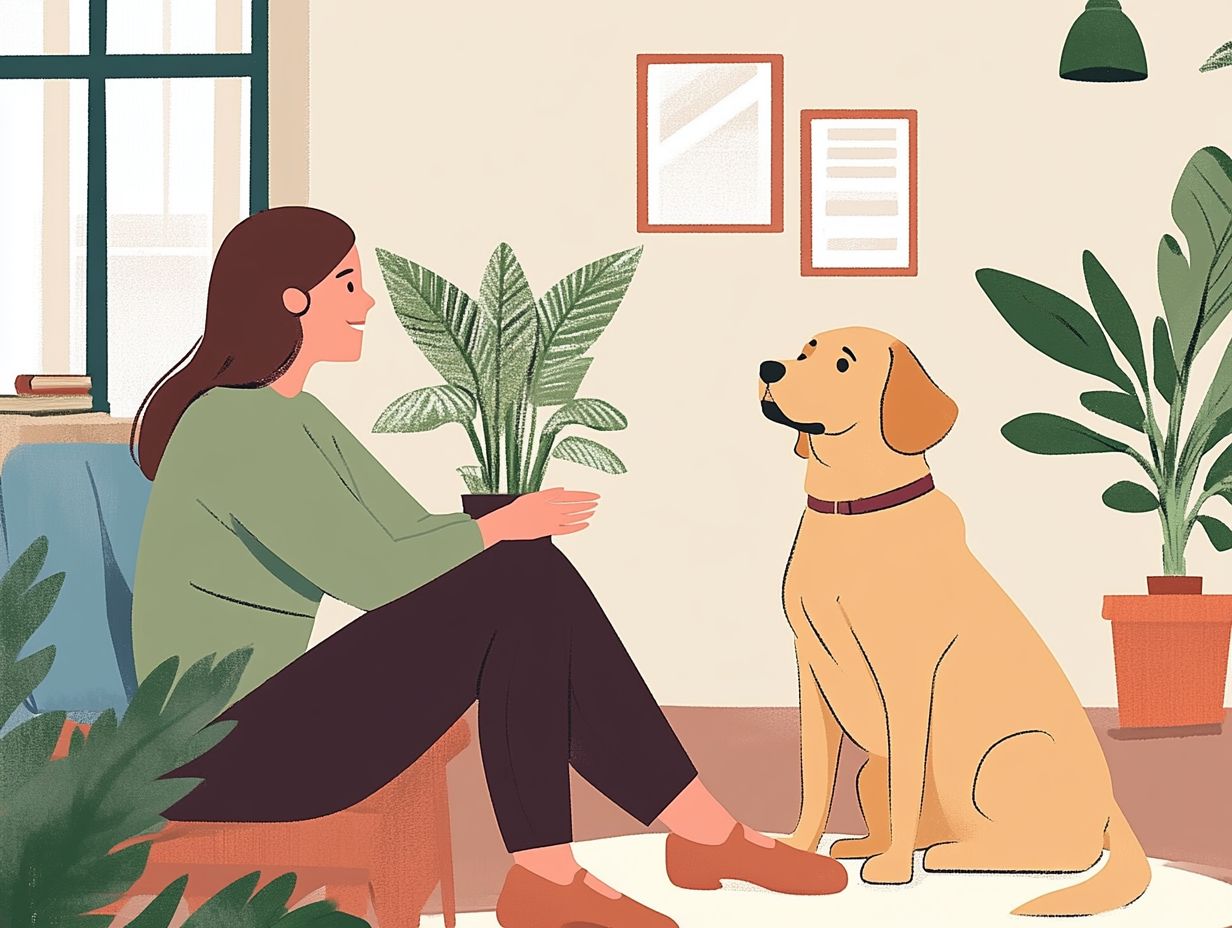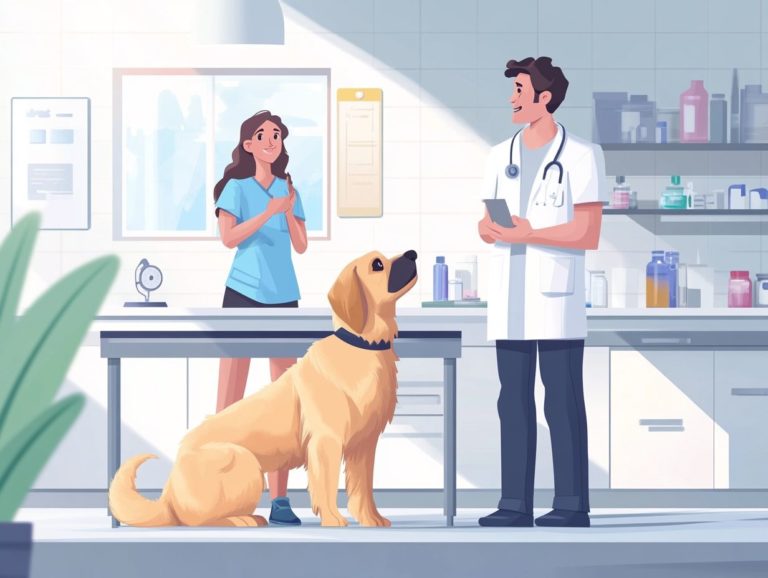How to Identify Qualified Pet Anxiety Professionals
Understanding pet anxiety is essential for ensuring the well-being of your furry companions. This article delves into the various causes and symptoms of anxiety in pets, emphasizing the importance of seeking professional help.
You ll discover the different types of professionals available to assist you, from veterinarians to animal behaviorists and trainers. It covers how to identify qualified experts, highlighting the vital certifications and experience to look for.
By the end, you ll be well-equipped to find the right support for your anxious pet, ensuring their happiness and comfort.
Contents
- Key Takeaways:
- Understanding Pet Anxiety
- The Importance of Seeking Professional Help
- Types of Professionals Who Can Help
- Qualifications to Look for in a Pet Anxiety Professional
- How to Find and Choose the Right Professional
- Frequently Asked Questions
- 1. Wondering what to look for in a pet anxiety expert?
- 2. Are there any red flags to watch out for when choosing a pet anxiety professional?
- 3. Can I trust online reviews to find a qualified pet anxiety professional?
- 4. Is it necessary for a pet anxiety professional to specialize in a certain type of animal?
- 5. What should I expect during my pet’s initial consultation with a qualified anxiety professional?
- 6. How can I confirm that a pet anxiety professional is licensed and in good standing?
Key Takeaways:
- Properly addressing pet anxiety requires the expertise of a qualified professional.
- Look for certifications, training, and experience when choosing a pet anxiety professional.
- Consider your pet’s specific needs when researching and interviewing potential professionals.
Understanding Pet Anxiety
Understanding pet anxiety is crucial for you as a pet owner who aims to cultivate a healthy emotional bond with your furry companion, especially regarding mental health.
Pet anxiety can reveal itself through behaviors like excessive barking, destructive chewing, or hiding. This can cause considerable distress for both you and your pet. This complex issue may arise from various factors, including shifts in daily routines, environmental stressors, or underlying cognitive disorders. Cognitive disorders refer to issues that affect memory, problem-solving, and other mental functions.
Recognizing these signs is your crucial first step toward providing emotional support and fostering overall emotional well-being for both you and your beloved pet.
Causes and Symptoms
Pet anxiety can stem from a variety of sources, each contributing to a range of symptoms that you need to identify in order to seek the right help. Common triggers include changes in the environment, insufficient training, or separation from you. These may result in behaviors like hiding, excessive barking, or even destructive antics.
Being able to recognize these symptoms is essential for addressing your pet’s emotional support needs, especially if they re grappling with anxiety disorders. By taking proactive steps, you can offer the stress relief they need and significantly enhance their emotional well-being.
Moving to a new home can be especially taxing for pets; the unfamiliar surroundings often amplify their anxiety. Introducing new pets into the mix can further disrupt established routines, leaving them feeling insecure.
It s crucial for you to create a safe haven where your pets can retreat when they feel anxious. Incorporating emotional support animals can also offer relief, providing companionship and emotional support during tough times.
Simple actions, like sticking to a consistent schedule for feeding and walks, can go a long way in alleviating anxiety and fostering a sense of security. By understanding these factors, you can effectively address your furry companions’ feelings and elevate their quality of life.
The Importance of Seeking Professional Help
Don’t wait! Seeking professional assistance for pet anxiety is vital for creating a nurturing environment that addresses both your pet’s and your emotional needs. Engaging with licensed mental health professionals can provide you with valuable insights into the psychological dimensions of pet ownership, including how to prepare for a pet anxiety consultation, guiding you on enhancing your pet’s emotional well-being.
Incorporating trained service dogs or emotional support animals can greatly enhance the therapeutic benefits of pet therapy, particularly for those navigating mental health challenges. This collaborative strategy ensures that your pets receive the necessary support during tough times while also enabling you to manage your responsibilities with greater ease.
Take the first step today. Your pet’s happiness depends on it!
Benefits of Working with a Qualified Professional
Engaging with a qualified professional brings a wealth of advantages that elevate the emotional support you provide to your pets. These experts will guide you in implementing effective training strategies that not only improve behavior but also strengthen the emotional bond you share with your furry companions.
Through structured interactions and reinforcement techniques, your pets will learn to respond more positively to various situations, reducing their stress and fostering a sense of security. Such transformations cultivate a safer and more enjoyable environment, allowing you to feel more confident in managing your companions needs.
The long-term therapeutic benefits of this partnership can lead to improved mental health outcomes, ensuring that both you and your pets thrive together, enabled by the expertise of qualified professionals.
Types of Professionals Who Can Help

Here are the key professionals who can help your furry friends overcome anxiety:
A diverse array of professionals is poised to address pet anxiety, each contributing their distinct expertise to ensure comprehensive care for pets requiring emotional support. Veterinarians offer medical interventions and advice, while animal behaviorists excel in understanding and modifying pet behavior. For a deeper insight into this topic, consider exploring understanding different types of pet anxiety experts.
Dog trainers and coaches are vital in implementing effective training strategies tailored to the unique needs of individual pets, particularly those designated as emotional support animals. By collaborating with these experts, pet owners can acquire invaluable insights and strategies that promote emotional wellness and alleviate anxiety in their beloved companions.
Veterinarians
Veterinarians are heroes for our pets, tackling anxiety and ensuring their health! They play a crucial role in managing your pet’s anxiety by assessing their overall health and identifying any underlying conditions that could contribute to their stress.
With their deep understanding of both physical and mental health, they can address various anxiety-related symptoms. This ensures that your furry friend receives the care necessary for emotional wellness. Engaging with a veterinarian is often the first step toward effective intervention and much-needed stress relief for pets dealing with anxiety.
Veterinarians also conduct thorough medical evaluations, including physical examinations and diagnostic tests, to rule out any health issues that might worsen anxiety, such as pain or hormonal imbalances. Following this, they may perform a simple check to see how your pet behaves in different situations, helping to pinpoint specific triggers.
This comprehensive assessment allows veterinarians to tailor treatment plans that could include behavioral therapy, environmental modifications, and the introduction of calming techniques.
Veterinarians take a comprehensive approach to ensure your pet’s happiness and health! They recognize that emotional well-being is just as vital as physical health. They guide you in providing essential emotional support, enriching the overall quality of life for your beloved pet.
Animal Behaviorists
Animal behaviorists are the specialists you want in your corner when it comes to changing your pet’s behavior. They are particularly skilled in addressing your pet’s anxiety through customized training techniques. By diving into the root causes of your pet’s anxious behaviors, these professionals can implement effective strategies that provide emotional support and alleviate stress.
They analyze behaviors to pinpoint triggers. Then, they craft individualized plans that enhance the emotional wellness and companionship between you and your furry friend. Collaborating with an animal behaviorist can lead to significant improvements in your pet’s quality of life and long-term mental health.
One effective technique these experts employ is desensitization, which involves gradually introducing your pet to anxiety-inducing stimuli in a controlled environment. This process helps reduce their sensitivity over time. Another method is counter-conditioning, which teaches your pet to feel safe in situations that once scared them.
Both approaches are designed to enable your pet, helping them handle stressors while deepening the bond you share. Ultimately, the combination of insightful behavioral assessments and proactive training regimens nurtures an environment where anxiety can be managed, paving the way for a happier and more secure pet.
Trainers and Coaches
Trainers and coaches are invaluable allies for you as a pet owner, especially when you’re aiming to enhance your pet’s emotional well-being through effective training. They specialize in structured sessions designed to cultivate positive behaviors, which can have a profound impact on your pet’s ability to manage anxiety.
By employing positive reinforcement techniques, these experts help your pet develop skills that not only ease anxiety but also strengthen the emotional bond between you two. Engaging with a skilled trainer can lead to noticeable improvements in your pet’s behavior and overall emotional health.
These professionals often customize their training methods to meet individual needs. They incorporate everything from obedience training to agility exercises. Obedience training lays down clear commands and expectations, fostering a sense of security that many pets crave.
Meanwhile, agility exercises offer both physical stimulation and mental engagement, serving as an excellent outlet for stress relief. Coaches closely monitor progress, adjusting techniques as necessary to maximize the benefits for both you and your pet.
This holistic approach not only brings immediate changes but also builds a lasting bond rooted in trust and understanding. Ultimately, this contributes to a more balanced emotional state for your furry companion.
Qualifications to Look for in a Pet Anxiety Professional
Don’t wait to find the right pet anxiety professional—after all, you want the best care for your furry friend! Finding the right professional demands thoughtful consideration of their qualifications, certifications, and training. Be sure to review the top questions to ask your pet anxiety specialist to ensure they can effectively address your pet’s needs.
Professionals who possess relevant certifications and specialized training in behavioral issues or emotional support offer a more tailored approach that caters to your pet’s unique circumstances. By prioritizing these qualifications, you can engage with knowledgeable experts who truly understand the role of veterinary professionals in pet anxiety.
They are equipped to provide essential support for your pet’s emotional well-being.
Certifications and Training

Certifications and training are essential markers of a pet anxiety professional’s competence and expertise in delivering effective care. When you see a professional with certifications from recognized organizations, it’s a clear sign of their commitment to ongoing education and adherence to industry standards, which are signs you’ve found the right pet anxiety expert.
These credentials show a deep understanding of various training methodologies tailored to different types of pets. This enables professionals to implement impactful interventions. Specialized certifications in emotional support allow them to craft personalized plans that address the unique needs of each animal, ultimately enhancing their overall well-being.
For you, as a pet owner, verifying these qualifications not only builds trust but also cultivates a collaborative environment where both the caregiver and your beloved pet can flourish. When professionals apply their skills, backed by recognized certifications, they can significantly elevate the quality of life for anxious pets and their families.
Experience and Specializations
When selecting a professional to address your pet’s emotional needs, understanding what makes an effective pet anxiety counselor is paramount.
This expertise enables them to craft customized care plans that truly resonate with the unique personalities and requirements of different breeds.
For instance, a professional who has worked extensively with anxiety in rescue dogs will likely employ different strategies than those who focus on calming techniques for smaller, more anxious breeds.
Their profound understanding of emotional support animals animals that help reduce anxiety and provide comfort is pivotal in developing strategies that not only alleviate anxiety but also strengthen the bond between you and your pet.
With a nuanced insight into the complexities of various behavioral issues, seasoned professionals enhance the overall effectiveness of the care they provide. This ensures that your beloved companion receives the best possible support.
How to Find and Choose the Right Professional
Finding and selecting the ideal professional to tackle your pet’s anxiety requires a thoughtful approach that prioritizes your pet’s emotional support and overall well-being. Knowing when to consult a professional for pet anxiety can be a crucial step in this process.
Start by researching available professionals in your area. Pay close attention to their qualifications and specialized skills.
Engage with someone who truly understands the specific anxiety issues your pet faces and can provide tailored solutions for effective intervention.
Take your time to evaluate candidates. This helps you make better choices for your pet and enhances their quality of life in the long run.
Researching and Interviewing Candidates
Researching and interviewing candidates for pet anxiety support is essential in finding a qualified professional who can truly address your pet’s emotional needs, highlighting the importance of professional guidance in pet anxiety.
Get ready to explore a variety of resources that can lead you to the perfect professional! Immerse yourself in online platforms, including professional directories, specialized forums, and social media groups dedicated to pet care and training.
These resources can be treasure troves of information and leads.
Don t overlook community resources, such as local veterinarians or pet stores; they often have valuable recommendations that can guide your search.
During the interviews, ask the right questions that dive into their qualifications, such as any certifications or training they possess specifically focused on anxiety in animals.
Inquire about the methods they employ to foster emotional support, ensuring their approach aligns with your pet’s unique temperament and needs.
These considerations will help you select the ideal candidate and give you the peace of mind that your beloved pet is in compassionate and capable hands.
Considering Your Pet’s Needs
Considering your pet’s unique needs is essential in discovering the right professional to tackle pet anxiety and provide meaningful emotional support. You can find the top pet anxiety experts in your area to help with this.
Each pet displays distinct signs of anxiety and requires customized strategies to ease their distress.
By observing your pet’s behavior in various situations, you can identify specific triggers, such as loud noises or unfamiliar environments.
Pay attention to signs like excessive barking, hiding, or changes in eating habits; these may indicate discomfort or fear.
Recognizing these patterns aids in tailoring care and helps foster a sense of companionship during stressful times.
Engaging with a qualified trainer or veterinarian proves invaluable, as they can provide insights tailored to your pet’s individual needs. This ensures a comprehensive approach to emotional support.
Frequently Asked Questions

1. Wondering what to look for in a pet anxiety expert?
You should look for a pet anxiety professional who has a degree in animal behavior or a related field, is certified by a reputable organization such as the Animal Behavior Society, and understands what makes a great pet anxiety specialist while having experience working with anxious pets.
2. Are there any red flags to watch out for when choosing a pet anxiety professional?
Be wary of anyone promising a “quick fix” for pet anxiety.
Look for professionals with formal education and a steady client base to ensure quality care.
3. Can I trust online reviews to find a qualified pet anxiety professional?
Wondering if that online review is trustworthy? Here s what to look for: while online reviews can be helpful, take them with a grain of salt.
Do your own research by checking multiple sources and reaching out to past clients for their personal experiences.
4. Is it necessary for a pet anxiety professional to specialize in a certain type of animal?
While some professionals may focus on specific animals, it’s not always necessary.
The key factor is their knowledge and experience in treating anxiety in animals, regardless of the species.
5. What should I expect during my pet’s initial consultation with a qualified anxiety professional?
During the initial consultation, the professional should get to know your pet and identify their specific anxiety triggers.
They may also ask about your pet’s medical history and any previous treatments. This information helps create a personalized treatment plan.
6. How can I confirm that a pet anxiety professional is licensed and in good standing?
To confirm a professional’s credentials, check with your state’s licensing board or their certification organization.
Don t hesitate to ask for references or look for any complaints against the professional. Ensuring they are in good standing is crucial for your pet’s wellbeing!






